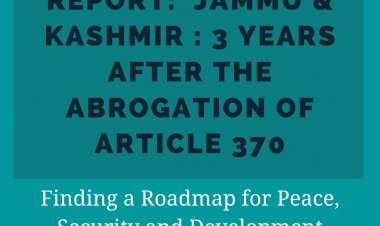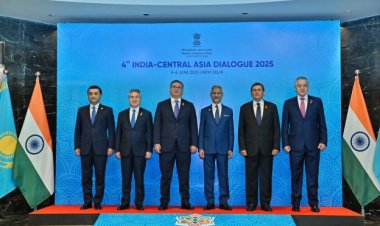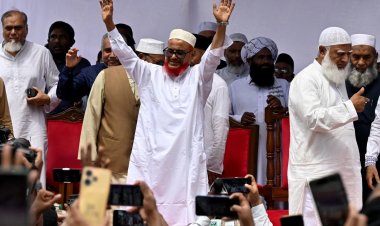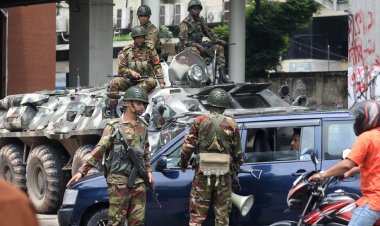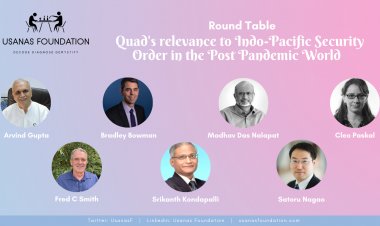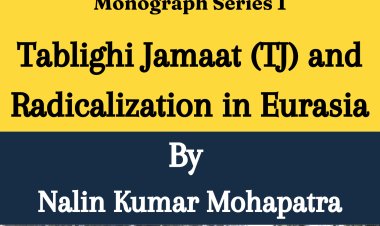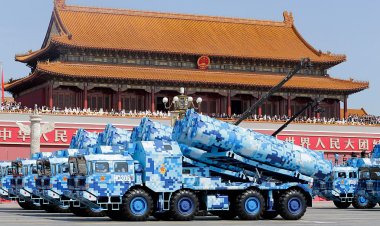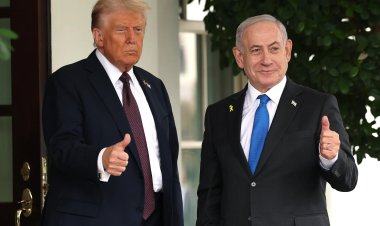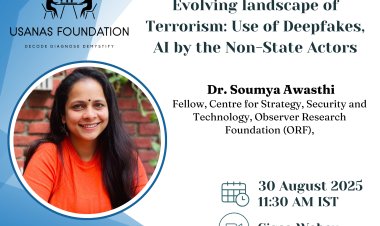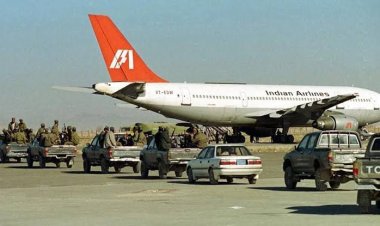Exporting Terror: A Dossier on Pakistan’s Jihadi Infrastructure

Report
Report Curator - Dr. Abhinav Pandya, CEO and Founder, Usanas Foundation
Compiled By - Preeti Khenta, Associate Fellow
Head, Research Team - Ruchika Sharma, Program Coordinator
Rapporteurs - Aadya Pasarkar, Aahan Sen, Harsh Pargat, Suman Kumar
Pakistan is the result of 1200 years of Islamic extremism, separatism, and exclusivism in the Indian subcontinent. Even during the long periods of Islamic rule in India, the dominant trends were extremism, forced conversions, and temple demolitions, although these were occasionally interrupted by moments of communal harmony. However, the prevailing trends were religious in nature, and religious scholars like Sheikh Ahmad Sirhindi promoted an exclusivist and rigid, puritanical form of Islam in the 16th and 17th centuries.
Following the revolt of 1857, the Muslim aristocracy faced significant decline due to British suppression, leading to a deep existential crisis among Indian Muslims. At the same time, there was a sharp resurgence of Islamic extremism, revivalism, and puritanic thought. The Islamic movement began as early as the 1740s with Shah Waliullah, who reasoned that Muslims in India had declined because they strayed from pure Islamic principles and deviated by embracing Hindu practices like visiting pirs and Mazaars. He called for a return to, and teaching of, fundamental Islamic values, often through radical and fanatic preaching. After 1857, these tendencies consolidated and gradually expanded into the political sphere. This evolution is evident first in the ideas of Sir Syed Ahmed Khan, a political reformer highly esteemed among political leaders, yet holding exclusivist and separatist views. Later on, Muhammad Iqbal promoted the concept of Muslim separatism, along with the sense of Islamic superiority and exclusivism complex. Ultimately, Jinnah championed the cause of Pakistan as a separate homeland for Muslims. Following Pakistan's formation, the push to establish it as a strict Islamic state profoundly influenced the country's political discourse. Deobandi extremist groups led this movement; the first targets were the Ahmadiyya community, which, in 1974, was declared non-Muslim through constitutional change. By 1979, after the Russian invasion of Afghanistan, American intervention supported ISI-led proxy jihadist groups to fight against the Soviets. The year 1980 marked a turning point, unleashing violent jihad in Pakistan. Since then, Pakistan has developed a significant infrastructure of terrorist organisations and Islamic groups, shaping the destiny and demographics of South Asia and impacting globally over the past three to four decades.
Pakistan’s deep-seated obsession with India and intense hatred towards Hindu India has also shaped the rise of Jihadism in Pakistan. For an in-depth analysis, refer to the CEO and Founder, Usanas Foundation, Dr. Abhinav Pandya’s book, Radicalization in India: An Exploration.
Pakistan undeniably plays a crucial role as a significant hub of global jihadism. Theoretically, it is an integral part of the broader geographical region known as Khorasan. Khorasan, often regarded as the cradle of Islamic civilization, played a significant role in the Abbasid Revolution from 747 to 750 CE, which led to the downfall of the Umayyad Caliphate. This revolution, led by Abu Muslim al-Khorasani, marks a key moment of political change in the Islamic world. The historical region of Khorasan, which encompasses parts of modern-day Iran, Pakistan, Afghanistan, and Central Asia, was among the earliest areas conquered by Muslim armies in the 7th century. A well-known hadith even states that Prophet Mohammed foretold that an army would rise from Khorasan, carrying black banners, signalling the arrival of the Mahdi. The Mahdi is seen as a messianic figure expected to appear before the Day of Judgment to bring justice and righteousness. In Shia Islam, he is identified as the twelfth Imam, Muhammad al-Mahdi, while Sunni Muslims view the Mahdi as a divinely inspired leader. In modern times, these black banners have been used by Al-Qaeda, ISIS and ISKP (Islamic State Khorasan Province while the term Khorasan invoked its historical and eschatological significance to legitimize their violence.
In 712 CE, the first major Islamic incursion occurred in the Indian subcontinent with the Arab conquest of Sindh under the Umayyad Caliphate. Raja Dahir of the Hindu Brahmin Dynasty was overthrown and marked the establishment of Sindh as Bab-ul Islam, Gateway to Islam. This conquest led to massacres at Debal and Brahmnabad and the enslavement of thousands, including women. Ultimately, this event laid the groundwork for a lasting Islamic presence in South Asia.
Notably, terrorist groups like Lashkar-e-Taiba have always had international affiliations. In the 1980s, Lashkar was active in Afghanistan and both Lashkar and Jaish also fought with the Taliban in 2021. Lashkar has trained jihadists across the globe and was even operating in Bosnia. Jaish leader Masood Azhar raised finances by travelling across the world, gaining notoriety for spreading Jihad in the UK. His 1992 visit to the UK led to the onset of Jihadism in the UK, where he delivered lectures in 40 mosques, raising a huge amount of money to contribute to terror financing. Masood is also infamously remembered for the IC-814 hijacking and maintained regular contacts with Somalian Jihadists. For more details, refer to Dr. Pandya's Book, Inside the Terrifying World of Jaish- e -Mohammed. Additionally, Pakistan is also a critical hub in the global Terror Financing network as it has robust ties with the Global Islamist Organisation and the Charities operating from the Gulf and Western Countries. For further insights, refer to Dr. Pandya's book, Terror Financing in Kashmir.
After the US invasion of Afghanistan, the infamous Af-Pak region became a haven for Jihadi terrorist, with many Al-qaeda and Taliban leaders finding refuge in Pakistan. Masterminds of the 9/11 attacks and the leaders of Al-Qaeda were all captured within Pakistani borders, be it Osama bin Laden, Khalid Sheikh Mohammed (KSM), Ramzi bin al-Shibh, and Ayman al-Zawahiri. Pakistan's Military and Intelligence agencies have long been supporting these jihadists. Notably, the Kunduz airlift, where almost 3000 terrorists were evacuated from Afghanistan to Pakistan after the US invasion, where they were sheltered by ISI. This isn’t an isolated incident; Pakistan‘s history of providing shelter to Jihadists extends back many years. The man who created Al-Qaeda, Abu Musab al-Zarqawi, in West Asia, travelled to Pakistan during the Soviet-Afghan war, but by the time he arrived, the Soviets had already withdrawn. He eventually stayed back in Pakistan and got in touch with Al-Qaeda leaders who funded him to establish a training camp in Herat, Afghanistan and formed the group Jama'at al-Tawhid wal-Jihad (Organization of Monotheism and Jihad) and later moved to Iraq via Iran following the US invasion.
The Pakistani military and Intelligence apparatus have always sheltered terrorists and Jihadists and perpetrated numerous attacks on India, such as the Parliament attack,2001, the Mumbai Attack, 2008, the Pathankot military base attack, 2016 and more recently the Pahalgam attack, April 2025. They are not only harboring these jihadist networks but also funding their operations and running their terror facilities. More recently, Pakistani terror groups like Jaish-e-Mohammed and Lashkar-e-Taiba have developed robust ties with West Asian terrorist groups like Hamas. Hamas leaders have been spotted engaging with Kashmir-specific terror groups at various events, further highlighting these troubling alliances.
Pakistan has created a nexus of various terrorist groups and has consistently positioned itself at the centre of efforts to propagate Jihad worldwide. This pursuit seeks to justify the very foundation of Pakistan’s creation as its religious obligation. However, it is perplexing to see that the World knows the activities of Pakistan, yet the international community remains largely indifferent to taking action against such a religiously fanatical state whose aim is to divide the world on a religious basis. This report is a comprehensive dossier detailing the attacks around the globe that have been linked to Pakistan.
Download the detailed Report :

